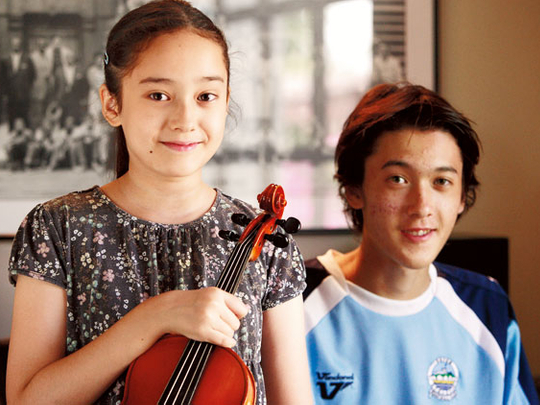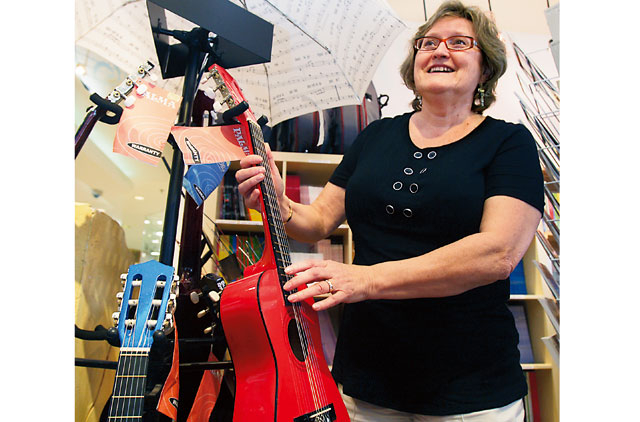
At seven, Yousef Khan learnt to play the guitar. His mum wanted it that way. So he did.
At 17, he switched.
Today he is an accomplished composer and tenor who plays and teaches the piano.
Many parents, in the manner of Yousef's mother Mehroon Khan, are inclined to select their children's musical instruments. They mean well of course. In the Khan household of six children, the brothers were expected to practise the guitar, drums and tabla, and their sisters, the piano.
Mehroon, a singer, wanted to make sure that her children developed their potential through exposure to music.
Though Yousef, a thoughtful and disciplined musician, excelled at classical guitar, he wasn't drawn to it in the manner he was to the piano.
"After my first lesson, I knew that it [the piano] reflected the kind of person I am," he says.
His example isn't an isolated one. Several factors influence a child's choice of instrument, including familial aspirations, peer pressure, image, gender, exposure to music and teachers' guidance. There is one more factor. One that is often overlooked - the child's personality.
At The Music Room, a Dubai-based store that deals in musical instruments and teaching material for schools, Carolyn Belsey Morton, the proprietor, can often guess which instrument a child - especially between ages five to eight - will select based on his personality.
"A bunch of noisy children bursting in the store will look at drum kits, trumpets or electrical guitars. Or if a parent visits [the store] with the child and selects the instrument, the expression on the child's face communicates whether he is happy with his parent's choice," she says.
Morton's career in music runs into three decades in England, Hong Kong, Kuwait and Dubai. She has managed music departments in schools, sung with the London Philharmonic Choir in the UK, conducted the Dubai Singers group, and plays the piano and cello.
She recognised the correlation between personality traits and musical instruments at the start of her career. She understood the link in context of how it related to the demands of learning an instrument. It was clear that some instruments are defined by slow progress and perseverance, others by quick progress in a social environment.
"Take a violin for instance," she says. "It doesn't produce a pleasant sound immediately and requires perseverance and focus [to master]. Whereas a brass or woodwind instrument produces melodic, instant results; a child with qualities of extroversion and/or impatience is inclined to opt for these."
Observably, Morton's thoughts align themselves with a pattern acknowledged by teachers and musicians alike.
Abandon the wrong instrument; choose the right one
Musician and teacher Tyler Smith, who is also the Middle East coordinator of music, performing and creative arts at Trinity College London, Dubai, has been teaching students for more than 30 years.
He first noticed the pattern between personality traits and musical instruments in the mid 1970s, and mostly among ten to 14-year-olds. "I realised that there were certain kinds of students who were taking lessons in piano, but only a few were excelling. Others weren't. Then a few years later, I saw the same students excelling in music, but with a different instrument. I also noticed that children play one instrument at an early age, and as they grow older and undergo a personality change, they choose to play a different instrument," he says.
Smith, also the former director of Popular Music Institute, Wafi City, has seen children fail at playing an instrument because they learn it reluctantly. He says, "If a child wants to play an electric guitar, I'll check if he is physically able [to play it]. If not, I'll tell him or his parents to wait till he is older," adding, "but sometimes the parents might insist he learns a classical guitar [not an electric guitar] or learn the piano because the child's grandmother used to play it. Yes, parents have positive reasons, but they don't realise that they might be killing a young musician."
Smith himself started with a mandolin because his grandfather used to play it. A few months into learning, he realised he wasn't happy so he switched to the piano (aged five) He also tried the trumpet at school so he could play in the school band and then learnt the flute. The piano, however, remained his instrument of choice. He learnt it formally till he was 22.
Still the question remains whether these anecdotal stories have scientific validity. If yes, would it support Yousef's and Smith's reason for switching instruments; Morton's observation on how a musical instrument has much to do with the personality of the child; and Smith's critical opinion on how teaching the wrong instrument might kill a child's musical aptitude?
Research: validates with fine print
Dr Adrian North, professor of applied psychology at Heriot-Watt University in the UK, says, "There is a growing body of evidence establishing that there really are differences between the personalities of the people who play different musical instruments."
(Two years ago, North was instrumental in conducting a study involving more than 36,000 people from around the world to establish the connection between musical tastes and personality types. The findings stressed how musical tastes reflect personality: classical music fans were shy, while heavy metal aficionados were gentle and at ease with themselves.)
In his book, The Social and Applied Psychology of Music, co-authored with Professor David Hargreaves, North writes about Dr Anthony Kemp's work that substantiates the fundamental personality differences between the players of different instruments.
Referring to Kemp's conclusions North writes the most striking aspect of string players appears to be their introversion. Research with brass players demonstrates their considerable extraverted qualities. Furthermore, percussion players, particularly drummers, appear to share certain extraverted qualities of brass players.
Unsurprisingly, these findings have raised a few valid queries. The most obvious is that the findings are too general in the way they pigeonhole musicians according to their personalities. Moreover, a musician can play several instruments and one particular instrument in several styles.
According to Smith, there are exceptions to the rule. "Let's say you learn the piano or guitar, and play it for five or six years. In that time, you would have learnt to play and write music, and learnt that musical notes are the same [regardless of the instrument]. But it will be your personality that will make you say, ‘I'll rather be playing this'. Also there are subdivisions; you can choose a classical guitar to help you blend in [an ensemble] or an electric guitar to stand out."
Perhaps Smith's observations and North's thoughts will make sense if we explore the link through a tenable personality trait model - the Big Five. The model is one of the most comprehensive broad dimensions in contemporary psychology used to describe human personality.
The Big Five are extraversion (excitability, sociability, talkativeness, assertiveness and emotional expressiveness); agreeableness (altruism, kindness, affection and pro-social behaviours); conscientiousness (self-disciplined, organised, goal-directed behaviours); openness (imagination, insight and curiosity); and neuroticism (emotional instability, anxiety, moodiness, irritability, and sadness).
How musicians fit into the Big Five
Smith classifies guitars, drums and piano as extroverted instruments. Even voice as an instrument can be in the limelight, he says.
"When students tell me they want to be singers, more often than not, their personalities are extroverted. In fact, if I come across a student who isn't full of himself, he may never make it as a singer."
He categorises players of string, wind and brass instruments under agreeableness. "They play in ensembles and orchestras. They blend in. A rhythm or bass guitar player in a band could also fit in because he supports the guy on electrical guitar or the vocalist."
A pianist himself, who has performed and taught the piano and keyboards in South Africa, the UAE and the US, he is of the opinion that most pianists come under conscientiousness. As does he.
"Learning it [the piano] requires years of discipline. The piano can be a social as well as lead instrument. For instance, if a pianist plays as part of an orchestra, he could also come under agreeableness.
"Songwriters, on the other hand, are defined by openness. They put themselves out there. There aren't many who fall into this category, and perhaps this explains why there are more musicians than songwriters."
As for the fifth trait, Smith believes that people defined by emotional instability, anxiety, moodiness, irritability and sadness, in most cases do not have what it takes to be a successful musician.
"If you look at a few traits under neuroticism, perhaps they might apply to a songwriter and his songwriting process, but a musician needs stability."
Smith also suggests that a young musician could find himself fitting into more than one personality trait as his personality changes. "It does happen," he says.
Experience bliss
Teachers cannot stress enough on the ideal way to guide children towards learning the right instrument. This guidance should always include the aspect of enjoyment derived from playing that instrument.
Smith terms this aspect of enjoyment "bliss". A child's aptitude and enjoyment of playing an instrument have to go together.
He says, "You will find that children who do not enjoy learning the guitar will opt for video games. However, there are many who love their video games, but will play the guitar for hours if they enjoy it."
At the school, Smith has around 100 students, most of whom have been studying music for years. The ideal way to help your child pick up the right instrument is to wait, says Smith, who like Morton believes that a little bit too late is better than a little bit too early.
In other words, parents shouldn't hector their children.
He says, "Everybody wants their children to start from five to seven, but probably only a very small percentage need to. Unless the kid expresses interest to play a particular musical instrument because his parents play. It is similar to taking up reading after watching your parents pick books."
Morton concludes, saying. "When a parent comes to me for advice, I ask them to expose children to all kinds of music. Let them listen, sing, dance [to music]... and wait. Don't worry about teaching children to play an instrument when they are too young, when their fingers are too small, and when they aren't exposed enough to be able to choose. Let them learn even after the age of ten or 13, eventually they will find their level. It is far better to hear a child say, ‘I want to play that instrument because I like the sound,' instead of ‘because mum says so'."
Do students fit the personality trait model?
It's all very well to postulate among music teachers and experts, but do students really fit in that easily? Yousef definitely thinks so. Apart from composing music, he also teaches piano. He profiles five of his students:
"Anabelle Style, nine, fits the extraversion trait. She plays the piano and the guitar. She is highly sociable and can't stop talking. At the same time, she has impressive musical aptitude and she knows it. She prefers to play the guitar in an all-out performance style - behind her head. She loves jazz and swing.
"Charlotte Style, 11 [Anabelle's sister], quite easily fits in the agreeableness trait. She dutifully rehearses; rarely ever speaks out of turnand always tries her best. She is extremely hard-working and slaves away at the piano to get even the most difficult passages up to standard. She is comfortable with classical music and conventional rhythm. Their mum is an accomplished clarinettist and their dad, a jazz pianist.
"Almas Haidery, 14, is what I would call a conscientiousness student. She questions the rudiments of music and applies logic effectively. She is very dedicated and focused. She started learning the piano when she was eight and left after two years because she wasn't keen. Then on her own, she decided to take it up again.
"Charlotte Chalkley, 11, and her brother Christopher, 14, are also conscientious. They are extremely respectful and well-behaved. They practise and listen very carefully and are highly disciplined. They prefer playing classical music and are learning the piano [with me] and the violin with a different teacher. Their mum plays the piano."
Find the right teacher
Tyler Smith says he went through nine piano teachers before he began learning under one "who made all the difference".
It is important to find a teacher who is able to work with the personality of the student, he says. "If you have an introverted teacher with an extroverted student, there is almost always going to be friction. A teacher should be able to connect with the student."
From a teacher's point of view, he hopes that teachers will listen to the needs of different students. "If you're not fulfilling what they want to achieve with their music, as a teacher you aren't doing your job."
He also thinks that if children want to give up playing an instrument, the parents should consider changing the teacher.
"Why do so many kids become mathematicians? Mostly because they loved their maths teachers. When you find the right personality in a music teacher, the student stands a better chance of becoming a great musician."
Is this link between musical instruments and personality traits affected by gender?
In Smith's opinion, it has more to do with social acceptance. "Only in the past ten to 15 years have girls been allowed to play certain instruments socially. Also we rarely see boys and girls playing together. There is, however, genderised differences in the way girls and boys learn. Girls have an advantage when they are young because they have much better motor skills [than boys]"














